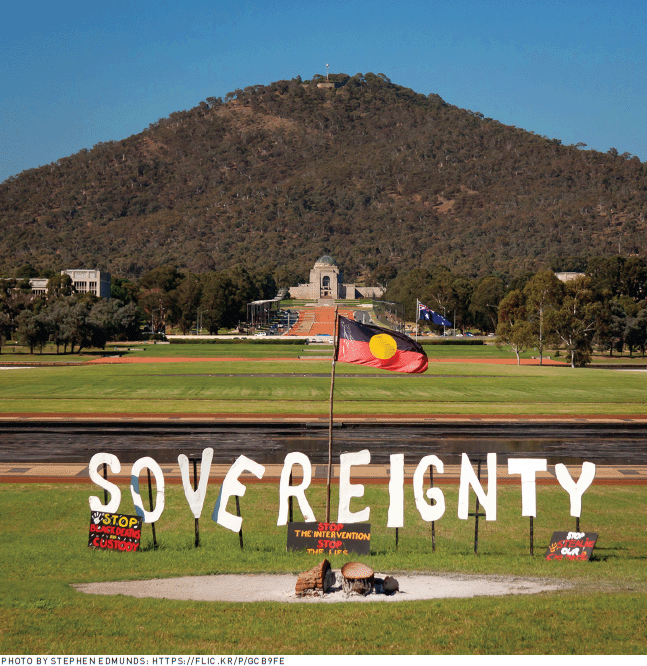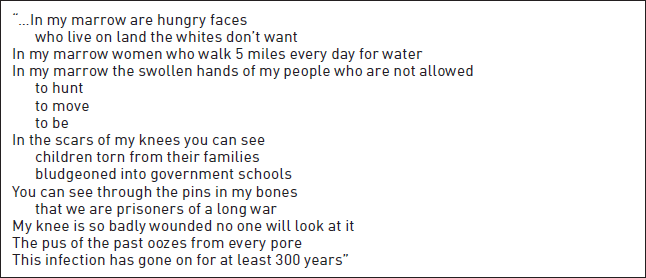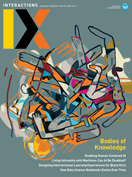Authors:
Gopinaath Kannabiran
Mullah Nasruddin was frantically searching the street at night. "What are you looking for?" asked his friend."
I lost my keys," responded Nasruddin. So his friend joined him and they both continued searching. After a while, his friend asked, "Where did you last see your keys?" to which Nasruddin replied, "At my home." Puzzled by his reply, his friend asked, "But why are you searching the street then?" Nasruddin sighed and replied, "Because there is more light under the streetlamp!"
 | Australian Aboriginal flag in a "Black death" protest in Canberra, Australia. |
The above Sufi fable humorously highlights an insightful critique relevant for research inquiry: We tend to search where it is easiest to look. Looking under the streetlamp, answers to the problems of Western humanist theories are sought through Western posthumanist efforts that decenter the human. For instance, Jamaican theorist Sylvia Wynter's profound contribution to unsettling the category of human is seldom acknowledged, but Western posthumanist theorists are lauded as radical and necessary for the rest of the world to follow. While attempts to unsettle the category of human are not new, posthumanism is propagated as a metanarrative required to break free from the problems of humanism. Specifically, posthumanism is narrated as the need of the hour with respect to ecological crises. Probing the posthuman metanarrative, I present post-post-HCI as a critical provocation of HCI knowledge production in the context of climate change. My critique strives to bring to a boil simmering tensions that otherwise remain ignored, spark discussions about humanism after posthumanism, and amplify concerns about geopolitical power struggles in relation to climate change.
Posthumanist metanarrative is particularly effective at tapping into the existential angst and collective guilt about ecological crises.
If we approach knowledge as emerging through material participation, then we must critically examine the conditions of possibility for such emergence. Posthumanist metanarratives are propelled by asking, What if humanist approaches are the culprits leading to collapse in biodiversity and environmental degradation? Returning the gaze, I juxtapose the question posed by Andrei Botez and colleagues: "What if posthumanist thinking and the decentred subject are tools for the propagation of a stronger but more elusive hegemonic system, one that spreads through the denial of all other grand narratives, including itself?" [1]. I create this discursive tension not as a binary reversal, but rather as a queering move that makes space for a third position attendant to the geopolitics of climate change. Posthumanist metanarratives masquerade as a counter-totality that is nonhierarchical, nonterritorial, benevolent toward all, and elusive to critique since it denies the search of its own bounded positionality [1]. And yet, as Tiffany Lethabo King points out, the "posthumanist's horn often blows from a place situated securely within the folds of humanity" and is built upon ethically problematic Western theorizations (see [2] for detailed arguments).
 | An excerpt from "I Walk in the History of My People" by Chrystos (1988) challenges the posthumanist move to narrate the past through the lens of discontinuity. |
Posthumanist metanarrative is particularly effective at tapping into the existential angst and collective guilt about ecological crises. The posthumanist impetus to "do something" about ecological crises begins with a characterization of existing humanist approaches as a monolithic paradigm that is exploitative of nonhuman Others. Positioning itself as a critical stance against and breaking away from those exploitative humanists over there, posthumanist declarations choose to narrate the past through the lens of discontinuity by invoking the center-periphery narrative. Emergence of posthumanist metanarrative involves: a) systematic classification of knowledge production practices using the center-periphery narrative, and b) characterization of discontinuity as necessarily liberatory. But what grounds our responsibilities if we (re) write our narratives as discontinuity from the past? Post-post-HCI is a two-pronged critical provocation that aims to: a) problematize the center-periphery narrative invoked by posthumanism, and b) defend the category of human as conceptually ambiguous and politically contentious yet ethically indispensable.
What are the ethical responsibilities of "more than human" metanarratives toward humans that are still treated as less than human?
There is a long-running debate about problems of the center-periphery model with respect to how global history is narrated. As Klemens Kaps and Andrea Komlosy note, "Many authors who use the center-periphery framework reproduced, in most cases unwillingly and against their own intentions, a Eurocentric perspective precisely by trying to critically explore Europe's and the West's path towards world hegemony" [3]. The center-periphery rhetoric is inescapably bound by the terms of discussion set by existing political interests and often does not acknowledge unequal bargaining power. Paying attention to geopolitical power relations is necessary for effectively engaging with climate change—related crises in accordance with the principle of "common but differentiated responsibilities and respective capabilities" (CBDR) put forth by the 1992 United Nations Framework Convention on Climate Change. Erika Strazzante and colleagues emphasize that "when it comes to climate change, it is crucial to recognise that the Global South and the Global North face different realities, which imply different capacities, resources as well as different priorities on the political agenda" [4]. Who stands to benefit from narratives that de-emphasize the role humans play while poorer nations continue to be dumping grounds for electronic waste?
King points out that "graduate students of color experience stress, anxiety, and unease as they confront the pressure to 'take up' more contemporary impulses within Western 'critical theory' to move 'beyond the human' or toward the posthuman" [2] inside university classrooms. In response to the prevailing push toward posthumanism, post-post-HCI is a subversive rewiring of the "circuit that the corporate university imposes on critical thinking: know, internalize, perform, disagree, and then center yourself" [2]. When faced with attempts at decentering the human, it is vital to remember that colonizing conquests were justified as a benevolent project of redefining the lives of uncivilized natives into civilized humans. As King argues, the "problem with the human is its scaffolding, not the category itself" [2]. I juxtapose the colonial past of redefining the human as a civilization project alongside posthumanist attempts of decentering the human as an ecological interventionist project. Confronting the willed amnesia about a traumatic past, post-post-HCI puts forth the question: Who gets to (re) define what it means to be human, on behalf of whom?
Sonia Kruks argues for defending the category of human by being critical of humanism in the name of humanism: "To erase 'the human' from consideration is to cut from under our feet the grounds on which we may contest certain practices and situations as oppressive [and] even the most flawed humanism still secretes an opposition to what dehumanizes" [5]. What are the ethical responsibilities of "more than human" metanarratives toward humans that are still treated as less than human? Kruks insists that we "should not consent to erase or indefinitely to deconstruct, decenter, or defer 'the human,'" because "in doing so, it becomes, at best, little more than a set of self-referential, intellectual maneuvers that have lost their purchase on the world, or at worst, a nihilism" [5]. Western posthumanist efforts chide humanism-informed design as exploitative of nonhuman Others and attempt to decenter the human with promises of better future for all. However, such efforts do not provide adequate ethical and conceptual grounds for engaging ontological (what is) and advocacy (what ought to be) issues that are rooted in the realities of geopolitical power struggles.
The seemingly virtuous move of renouncing human exceptionalism is built on the assumption that there is a stable and universal conceptualization of the human to begin with. Further, there are several forms of humanism that are grounded in ecological responsibility but conveniently ignored by the posthumanist metanarrative. All the brouhaha about moving beyond the human and speaking on behalf of nonhuman Others rests squarely on the human ability of language that is often starkly monolingual in posthumanist metanarratives. One of the fundamental problems of posthuman theorizations is its distorted conceptualization of human sovereignty as a form of "power over" that is hierarchical and extractive. Alexander Hirsch draws upon the works of Martinican philosopher Frantz Fanon, arguing that "true sovereignty is first and foremost a project of postcolonial regeneration [that] entails recalling dignity for oneself" [6]. Responding to posthuman metanarratives, King reminds us that "decolonial refusal and abolitionist skepticism respond to how perverse and reprehensible it is to ask Indigenous and Black people who cannot seem to escape death to move beyond the human or the desire to be human" [2]. For Fanon, sovereignty is "the freedom felt in the recognition of one's particularity, in the remembrance of one's own humanity" and an "abnegation of subjective particularity is precisely the problem with colonial hegemony" [6]. To this effect, post-post-HCI is not an outright rejection of posthumanism but rather a problematization of its theoretical claims, a call for accountability toward decolonization, and an invitation to think about humanism after posthumanism.
1. Botez, A., Hietanen, J., and Tikkanen, H. Mapping the absence: A theological critique of posthumanist influences in marketing and consumer research. Journal of Marketing Management 36, 15–16 (2020), 1391–1416; https://doi.org/10.1080/0267257X.2020.1805491
2. King, T.L. Humans involved: Lurking in the lines of posthumanist flight. Critical Ethnic Studies 3, 1 (2017), 162–185; https://doi.org/10.5749/jcritethnstud.3.1.0162
3. Kaps, K. and Komlosy, A. Centers and peripheries revisited: Polycentric connections or entangled hierarchies? Review (Fernand Braudel Center) 36, 3–4 (2013), 237–64; http://www.jstor.org/stable/90000017
4. Strazzante, E., Rycken, S., and Winkler, V. Global North and Global South: How Climate Change Uncovers Global Inequalities. Generation Climate Europe, 2022; https://gceurope.org/global-north-and-global-south-how-climate-change-uncovers-global-inequalities/
5. Kruks, S. Humanism after posthumanism. In Simone de Beauvoir and the Politics of Ambiguity. Oxford Univ. Press, 2012, 26–55.
6. Hirsch, A. Sovereignty surreal: Bataille and Fanon beyond the state of exception. Contemporary Political Theory 13 (2014), 287–306; https://doi.org/10.1057/cpt.2013.25
Gopinaath Kannabiran is a design educator, HCI researcher, yoga instructor, and sexual rights activist. [email protected]
Copyright held by author
The Digital Library is published by the Association for Computing Machinery. Copyright © 2023 ACM, Inc.








Post Comment
No Comments Found